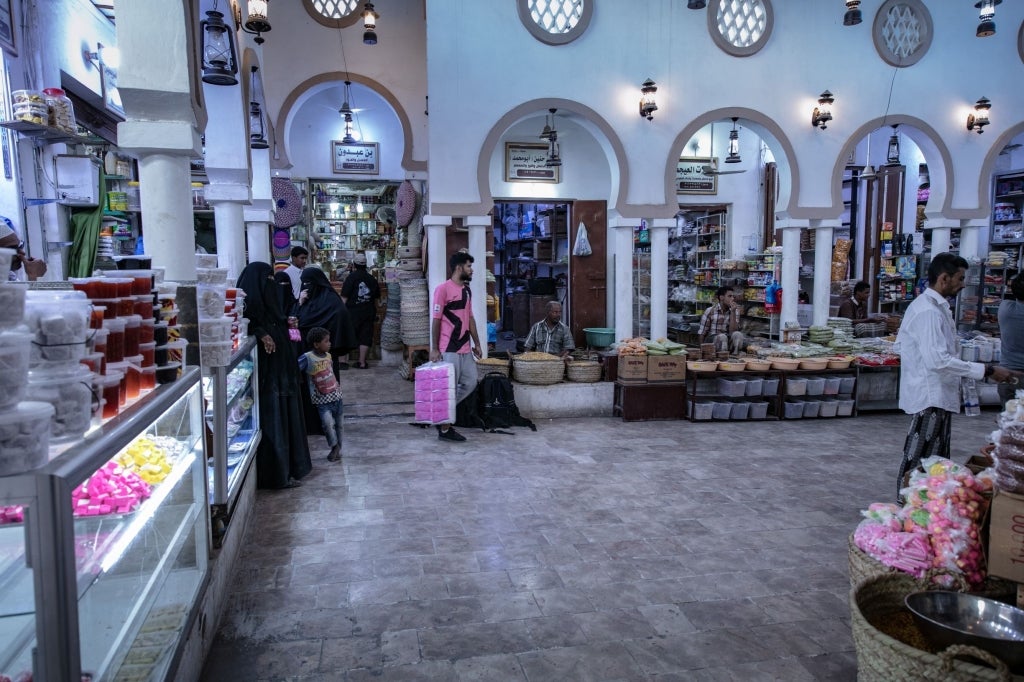 مدرسة الطبري في صنعاء هي واحدة من 235 مدرسة حكومية قام مشروع الأشغال العامة بترميمها. | الصورة بعدسة: برنامج الأمم المتحدة الإنمائي، اليمن/ 2018
مدرسة الطبري في صنعاء هي واحدة من 235 مدرسة حكومية قام مشروع الأشغال العامة بترميمها. | الصورة بعدسة: برنامج الأمم المتحدة الإنمائي، اليمن/ 2018
Not all Yemenis imagined a day when they’d lose sleep worrying about putting food on the table for their children. But war is destructive and has far reaching implications. Well into its sixth year, Yemen’s conflict has left the country in a state of such devastation that most Yemenis struggle to find employment to cover food and other essential needs.
The spread of poverty and hunger goes beyond individual suffering, pulling at the very social fabric of Yemen, its sense of community, and feeling of belonging.
Two decades of human development lost
The war in Yemen has not only wiped out previous gains in human development, it has thrown it back by two decades, according to the UNDP-commissioned study, the Impact of War in Yemen. By 2016, the war had already caused US$4 to 5 billion in damage to the country’s infrastructure, as well as nearly US$89 billion in lost economic output. Yemen’s currency has plummeted as Gross Domestic Product has shrunk by nearly 28%; rates of unemployment have doubled; access to fuel products is sporadic, at best; and 60% of Yemenis are jobless.
Yemenis are experiencing what many describe as the world's worst humanitarian crisis.
All of this has only increased the heavy burden Yemenis already carried. The burden assumes the form of psychological distress and pervasive worry about their livelihoods, health, children’s education, how their rent will be paid, and whether they and their families will have to flee their homes to resettle somewhere safer.
The majority of Yemenis live on less than US$1.90 a day, but the soaring cost of food is 73% to 178% higher than it was before the crisis worsened in 2015. With pervasive, extreme poverty and hunger, and a broken education system, the implications for future economic growth are severely constrained, setting the country on a long-term path of hardship for generations to come.
The World Bank’s partnership with UNDP Yemen began in recognition of this in 2016 with the US$400 million Yemen Emergency Crisis Response Project (YECRP), developed at a pivotal moment when a paradigm shift in thinking on development aid was necessary to prevent the further erosion of human development in Yemen. This partnership created an entry point for development initiatives to work alongside humanitarian interventions to build resilience in communities and individuals, and help pave the way to their future recovery.
Yemen’s World Bank–UNDP partnership has invested in two vital national institutions, the Social Fund for Development (SFD) and the Public Works Project (PWP), as well as their local networks. Millions of Yemenis affected by fragility, conflict, and violence are dependent on the critical services these programs provide.
Rebuilding lives and communities from the ground up
The conflict has a severe impact on over one-third of Yemeni businesses, with many having to cut back their operations. Between March 2015 and December 2018, much of Yemen’s civil infrastructure suffered war damage, halting the production, storage, and distribution of food and goods. This resulted in massive layoffs and a liquidity crisis in local markets, with many people forced to sell their assets to make ends meet. As thousands lost their jobs and livelihoods, and the war ate into their capital, business owners and workers alike were forced to dip into their savings. But inflation has placed even their basic needs out of reach. Many have lost financial access to food, or medicine. Other supplies, once considered staples, cost too much for even those with an income.

Amidst this, the Yemen crisis response project has helped restore a sense of hope. YECRP recognizes that increasing the opportunity of income-generation and generating a livelihood for the most vulnerable groups of people—including women, youth and internally displaced—will strengthen local households, helping them cope and making them capable of contributing their communities.
YECRP’s cash-for-work and wage employment projects have been designed to broadly address Yemenis’ most pressing needs. In implementing nearly 2,400 cash-for-work and small-scale community infrastructure rehabilitation projects across the country, the project has been instrumental in reviving communities and giving citizens access to key services. Vulnerability is being reduced and some inequalities are diminishing.
The project has supported nearly 11,000 small businesses to create over 400,000 work opportunities for Yemenis with no other income generating options. It has provided almost 5 million people with access to water, food, health, education, sanitation, and roads. And, as Yemenis received training and capacity building in a variety of skills, and saw work opportunities open up in small-scale, community infrastructure projects, many regained their dignity and pride and a sense of hope.
Funded and supported by the World Bank’ International Development Association, the Yemen Emergency Crisis Response Project (YECRP) is implemented by the Social Fund for Development (SFD) and the Public Works Project (PWP) in partnership with UNDP. The US$400 million project provides economic stimuli in the form of large cash-for-work projects, support to small businesses and by supporting labor-intensive repairs of socio-economic assets, with the aim of benefiting vulnerable local households and communities across Yemen.


Join the Conversation